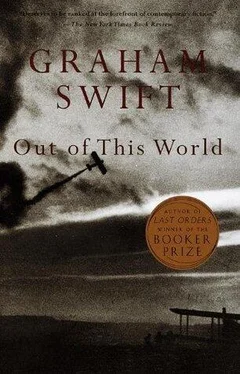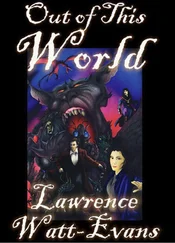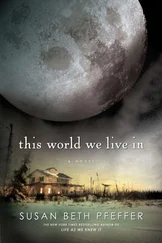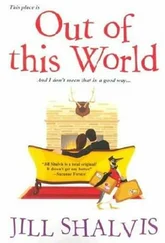Graham Swift - Out of This World
Здесь есть возможность читать онлайн «Graham Swift - Out of This World» весь текст электронной книги совершенно бесплатно (целиком полную версию без сокращений). В некоторых случаях можно слушать аудио, скачать через торрент в формате fb2 и присутствует краткое содержание. Год выпуска: 2012, Издательство: Vintage, Жанр: Современная проза, на английском языке. Описание произведения, (предисловие) а так же отзывы посетителей доступны на портале библиотеки ЛибКат.
- Название:Out of This World
- Автор:
- Издательство:Vintage
- Жанр:
- Год:2012
- ISBN:нет данных
- Рейтинг книги:3 / 5. Голосов: 1
-
Избранное:Добавить в избранное
- Отзывы:
-
Ваша оценка:
- 60
- 1
- 2
- 3
- 4
- 5
Out of This World: краткое содержание, описание и аннотация
Предлагаем к чтению аннотацию, описание, краткое содержание или предисловие (зависит от того, что написал сам автор книги «Out of This World»). Если вы не нашли необходимую информацию о книге — напишите в комментариях, мы постараемся отыскать её.
Out of This World — читать онлайн бесплатно полную книгу (весь текст) целиком
Ниже представлен текст книги, разбитый по страницам. Система сохранения места последней прочитанной страницы, позволяет с удобством читать онлайн бесплатно книгу «Out of This World», без необходимости каждый раз заново искать на чём Вы остановились. Поставьте закладку, и сможете в любой момент перейти на страницу, на которой закончили чтение.
Интервал:
Закладка:
That was the summer Argosy Tours finally went under. And it occurred to me afterwards that, even though he’d left Argosy three years before, that might have been his ‘business’. It was also the summer the Turks invaded Cyprus and the Junta fell in Greece. And if we’d met I might have asked him a question I’d always meant to ask him.
(No, Harry. You think everything’s got to be connected? It just happened at that time. The whole tourist thing hit Greece at that time. There was competition. There was an oil crisis. Mind you, Cyprus was a risk …)
I might even have been there myself. In Cyprus. One more time. Taking shots for UPI of Turkish troops commandeering hotels and foreign-owned villas, and of that other contingent that hadn’t been there in ’57, in ’64 — the baffled, stranded, indignant tourists.
But I had stopped all that. No news work, no photo work of any kind (the offers came, then petered out). I was making other arrangements. I was facing up to life in a picture-book cottage. Breathing country air. Meeting new neighbours. Like Doctor Warren. Yes, that’s all, just some sleeping pills. Isn’t it strange, Doctor, I can’t sleep, here, where it’s all so peaceful?
I might have travelled. I mean: just travelled. Been a tourist too. (Hang it, Harry, we all need a holiday some time.) Might have gone to Greece, like Sophie (but eight years later), to find Anna. But I don’t believe in ghosts. I don’t believe that Anna is up there on Olympus, watching Jenny and me descend a breezy hill in Wiltshire. No one knows about Anna.
I was trying to sleep, and have sweet dreams. I was trying to piece together my nerves and wondering how people ever contrive that impossible trick called Where I Live. I was lying awake haunted by the noise of owls and foxes. I would go for long, determined walks and watch the silver clouds gliding over green hills, rooks flapping over gnarled trees, and say to myself: I don’t believe this. I would come back to the cottage, open the front gate, walk through the picture-book façade and crawl into the tent of myself.
Sophie
But there are certain things that you’ll never remember, aren’t there, Doctor K? All you know is that they must have happened. Like trying to remember the point at which you fell asleep. I don’t remember when I first realized that Mum was never coming back. But maybe it wasn’t a realization, just a knowledge that seeped into my mind. Like the knowledge that Harry was never going to be at home much any more, he was never really going to be my father again. He’d done some deal — that’s how it seemed — struck some bargain with Grandad about being my father. He hadn’t found Mum and brought her home, but he still kept going away — out of guilt maybe. So perhaps if I’d said to him, It’s all right, Harry — it’s all right, Dad — you don’t have to be guilty about Mum, I know she’s dead really, he might have come back to stay for good. But by this time I’d grown to like having Grandad as my father, and I’d grown to realize — and the feeling was mutual — that I was the most precious thing he had.
Like I was never really afraid of his arm. I mean, his artificial arm. It was something different, something special about Grandad. I wasn’t afraid to touch it, to hold his cold, hard hand. And because I’d never known him without it, for a long time it never even occurred to me that once he must have had two real arms. He must have been waiting for the question to come, rehearsing the answer. Grandad, what happened to your arm? What he said was: Oh, I swapped it for a medal. Then he showed me the medal. It seemed such a drab little thing, a bit of dull metal and dull red ribbon, to swap for a whole arm. I didn’t know then it was a Victoria Cross, or what you had to do to get a Victoria Cross.
This was up in the study, surrounded by Uncle Edward’s, I mean, Great-uncle Edward’s books. He got the medal out of a little hinged box from one of the drawers of his desk. Then he showed me a photograph and said, Guess who this is? And the strangest thing about the photograph wasn’t that it was Grandad, taken years and years before, or that in it he had two arms — there it was, his real right arm, holding up a cigarette. The strangest thing was the face. The face was alive. Compared to the face of the Grandad I knew, that I was looking at right then, the face in the photograph was alive.
I don’t remember him ever telling me what he did. I mean, what he did at his office in London. Or what they did at ‘the factories’. Do you think he was always waiting to tell me that too? The right moment. Hoping perhaps he might never have to tell me, that I need never know. Just like me and the twins. All I knew was that every weekday he’d put on this smart suit and Ray would drive him up to town. Because in those days there wasn’t a trace of BMC at Hyfield itself. It was only much later, after Joe and I got married and got our place in Richmond, that he started to turn it into a sort of company headquarters. That’s what the papers called it: ‘Family home of the Beeches and unofficial headquarters of BMC’.
Harry used to call it ‘the arsenal’.
But even if I’d known — even when I did know — why should it have made any difference, why should I have given a damn? You judge by what you see, don’t you? And you see what’s closest first.
It must have seeped slowly into my mind too, so slowly you could almost ignore it, you could almost pretend you didn’t really know it. I can’t remember ever saying to myself, sitting on the terrace or under the apple trees in the orchard or looking out of the window as the rain fell on the lawn: Don’t be fooled by all this, don’t be taken in, remember what all this is made of.
But I remember, perfectly clearly, as if it were yesterday, that June morning when Grandad said, ‘Come with me.’ I remember the clean white shirt he was wearing with the dark green tie and the dog-tooth check trousers — they were not his ‘office’ clothes, even if this was, technically, an ‘office’ day. I remember the dew on the lawn and the sun just peering above the elms (it was not yet eight o’clock) and the air shivery yet gentle, as if Grandad had arranged, too, the promise of a perfect summer’s day. I remember his slow yet jaunty, teasing step. I remember the spiders’ webs glinting under the eaves of the stable, and every tuft of moss between the cobbles of the stable yard, and Ray standing there, waiting for us. And I remember the smell as we approached the stable door — a real stable door now, newly painted, not just the entrance to a store-shed. An unmistakable smell, a brown, warm, living smell.
Grandad opened, gently, the upper flap of the door and said, ‘Now look inside.’ But you didn’t need to. Because there, nudging forward to poke its head out, so the sunlight caught its wet nostrils and its chocolate eyes and the tuft of mane falling between them, was a pony.
Ray came a little closer and Grandad stood very still. Perhaps they were afraid I might be afraid. But I put out my hand, and it seemed to want to be stroked. It cocked its head to one side and I felt its rough lip against my bare arm. Then Grandad said, ‘Happy Birthday, my angel.’ And Ray said, ‘Happy Birthday, Miss Sophie.’
I was ten years old. Ten years old exactly. I don’t know where Harry was then, but he wasn’t there for his daughter’s birthday, and I didn’t believe Grandad when he said the pony was from both of them, from Harry as well.
Ray, who must have been carefully briefed, slipped a halter over the pony’s neck and gave the end to me. I led it round the yard, and Grandad said we had made good friends. I was all choked up with excitement. Then he said, if I could tear myself away, we would come back in a little while, but first he had something else to show me. We put the pony back in the stable and went back to the house. And there on the dining-room floor — Mrs Keane must have been briefed too — was a new saddle, bridle, girth, stirrups, cap, boots …
Читать дальшеИнтервал:
Закладка:
Похожие книги на «Out of This World»
Представляем Вашему вниманию похожие книги на «Out of This World» списком для выбора. Мы отобрали схожую по названию и смыслу литературу в надежде предоставить читателям больше вариантов отыскать новые, интересные, ещё непрочитанные произведения.
Обсуждение, отзывы о книге «Out of This World» и просто собственные мнения читателей. Оставьте ваши комментарии, напишите, что Вы думаете о произведении, его смысле или главных героях. Укажите что конкретно понравилось, а что нет, и почему Вы так считаете.












